Some 700 workers rallied on Thursday at the gates of the Montupet foundry in Diors, near Châtellerault in central France, in support of workers at the Fonderies du Poitou, another foundry in the group, on strike since September 2 against a 23 percent wage cut. The protest was called by the Communist Party-influenced national CGT (General Confederation of Labour), the CGT’s auto federation and the union’s local organisations.
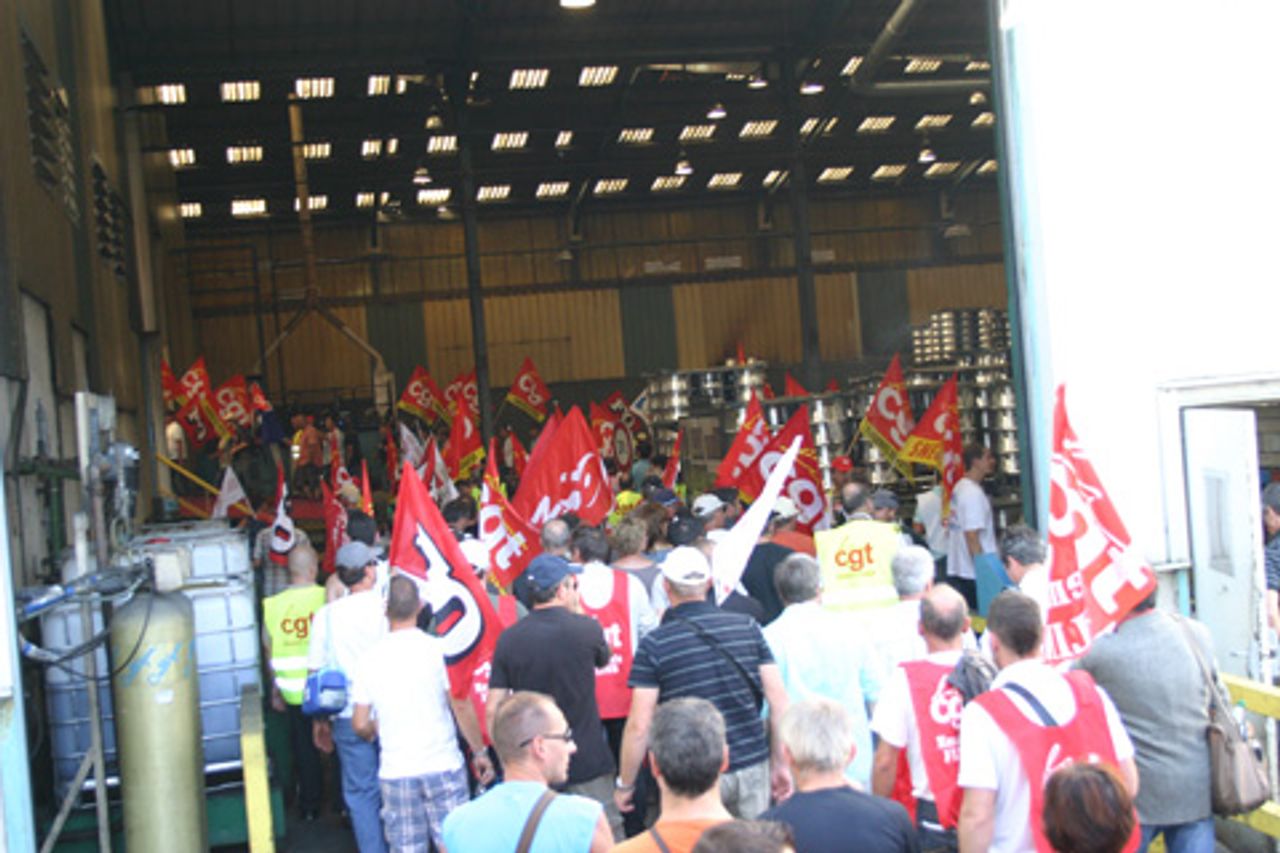 Entering the foundry
Entering the foundryThe Montupet group’s “competitiveness plan” involves mass sackings or plant closure if workers at their Fonderies du Poitou foundry in Ingrandes near Poitiers do not agree to the reduction of their hourly wage by 23 percent and an unpaid extension of the working week from 35 hours to 38.5 hours.
At the rally, Fonderies de Poitou workers chanted “Join us, fight with us” to non-striking Diors foundry workers. The site, where the CGT is the majority union, as at Fonderies du Poitou, was only partially on strike. Making up some half of the demonstrators, the strikers had come from Ingrandes in several coaches. Other delegations came from car and components plants in Paris, Blanquefort, La Rochelle, Le Mans and Bourges.
The Diors workers also face a 6 percent cut in their hourly wages and the unpaid extension of the working week.
Montupet management has justified the cuts by claiming that because of the economic situation, Renault will also have to reduce wages at its plants. The “competitiveness plan” will bring the Fonderies du Poitou’s wages into line with those of Montupet’s two other French foundries, the one in Diors and the other at Laigneville, Oise in northern France, where workers receive the legal minimum monthly wage (SMIC) of €1,200 (US$1,621) per month—a cut of between €300 and €400. The group’s aim is to reduce overall wage costs at its three French sites by 15 percent.
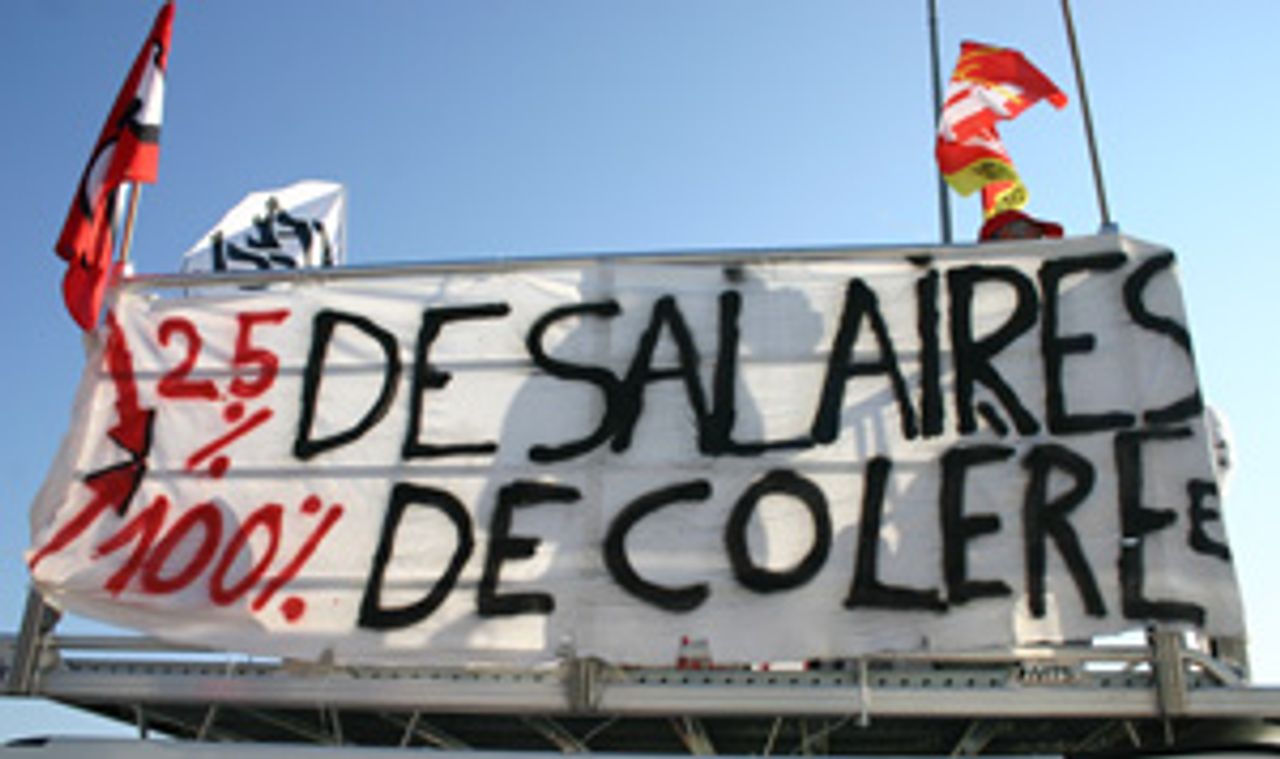 Banner reads: 25% of salary - 100% angry
Banner reads: 25% of salary - 100% angryThis writer has seen no union document calling for the earnings of the workers on the SMIC to be raised to the level of their colleagues at Fonderies du Poitou, neither at the local level of the CGT at the Ingrandes plant nor at the national level.
In an article in the Stalinist Communist Party (PCF) daily l’Humanité September 23 Tony Garrot, secretary of the CGT at the Fonderies du Poitou, asserts: “We knew right from the start that the final aim anyway was a redundancy plan.” Furthermore, he claims to understand that his plant’s situation is just one element in a nationwide assault on car workers: “The restructuring of the French motor industry promises nothing good for workers: site closures, job cuts, attacks on salaries.” But Garrot offers no perspective to fight these attacks.
Built by Renault in 1980 and later sold off, the foundry has had several owners since. It is estimated that since Montupet took it over in 2009, productivity has risen by 30 percent through increased exploitation of the workforce. The foundry’s entire production of aluminium cylinder heads supplies the two major French motor companies: 85 percent to Renault and 15 percent to PSA Peugeot-Citroën.
Montupet owns four other car component plants: one each in Spain, Bulgaria, the UK and Mexico. In a statement, the Montupet board of directors March 31 describe the last three as “low-cost” and that “In the coming years, to respond to the requirements of its customers, it will be mainly in Mexico, Bulgaria and the UK that Montupet will be increasing its production capacity by major investments up to 2013.”
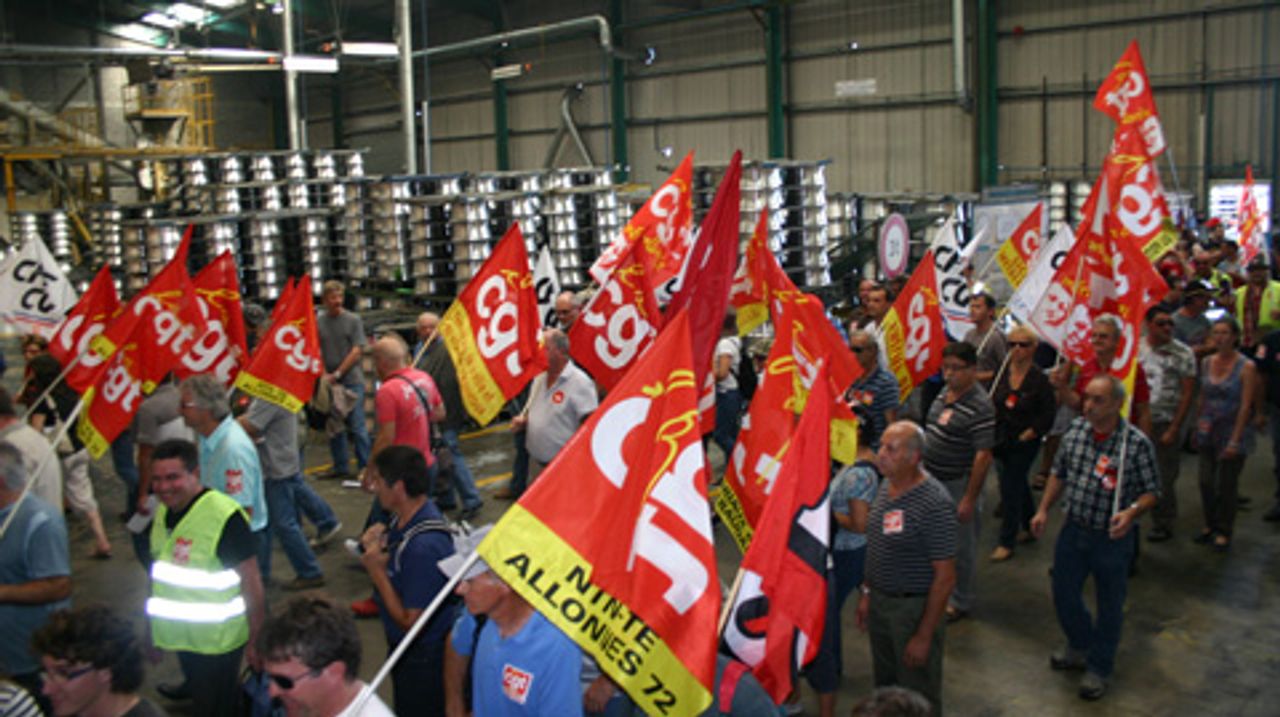 Inside the foundry
Inside the foundryIn order to convince workers that deals can be struck with the government and the employers, the CGT bureaucracy chooses to ignore that the automobile industry worldwide, not just in France, is restructuring as companies tool up for savage competition in the gathering global recession. The process is being led by the US motor industry in a tripartite offensive against the car workers by the Obama administration, the auto bosses and the United Auto Workers (UAW).
The lowering of wages is a key element of the Obama administration’s goal of doubling US exports by 2015. The administration, with the UAW in harness, spearheaded the drive to cut wages during the forced bankruptcies and restructuring of General Motors and Chrysler in 2009.
The race to the bottom for wages and conditions is now on worldwide. The CGT’s Garrot has clearly joined this race. The headline of his September 22 article in L’Humanité summarizes the CGT position: “Montupet must invest so as to put us back in the race.”
The perspective of the CGT for the Fonderies du Poitou is restricted to an attempt to save that plant apart from a struggle to unify car workers in Europe and globally against the giant conglomerates. The futility of this approach belies the hypocritical words of the CGT’s September 21 appeal for support for the Thursday rally at Diors: “It is urgent to put a stop to the pitting of sites against each other, which destroys the motor industry and jobs.” The appeal asks the rhetorical question: “Who can think that the competitiveness plan, the aim of which is to slash wages by 25 percent, will stop at Châtellerault [where Ingrandes is located]?”
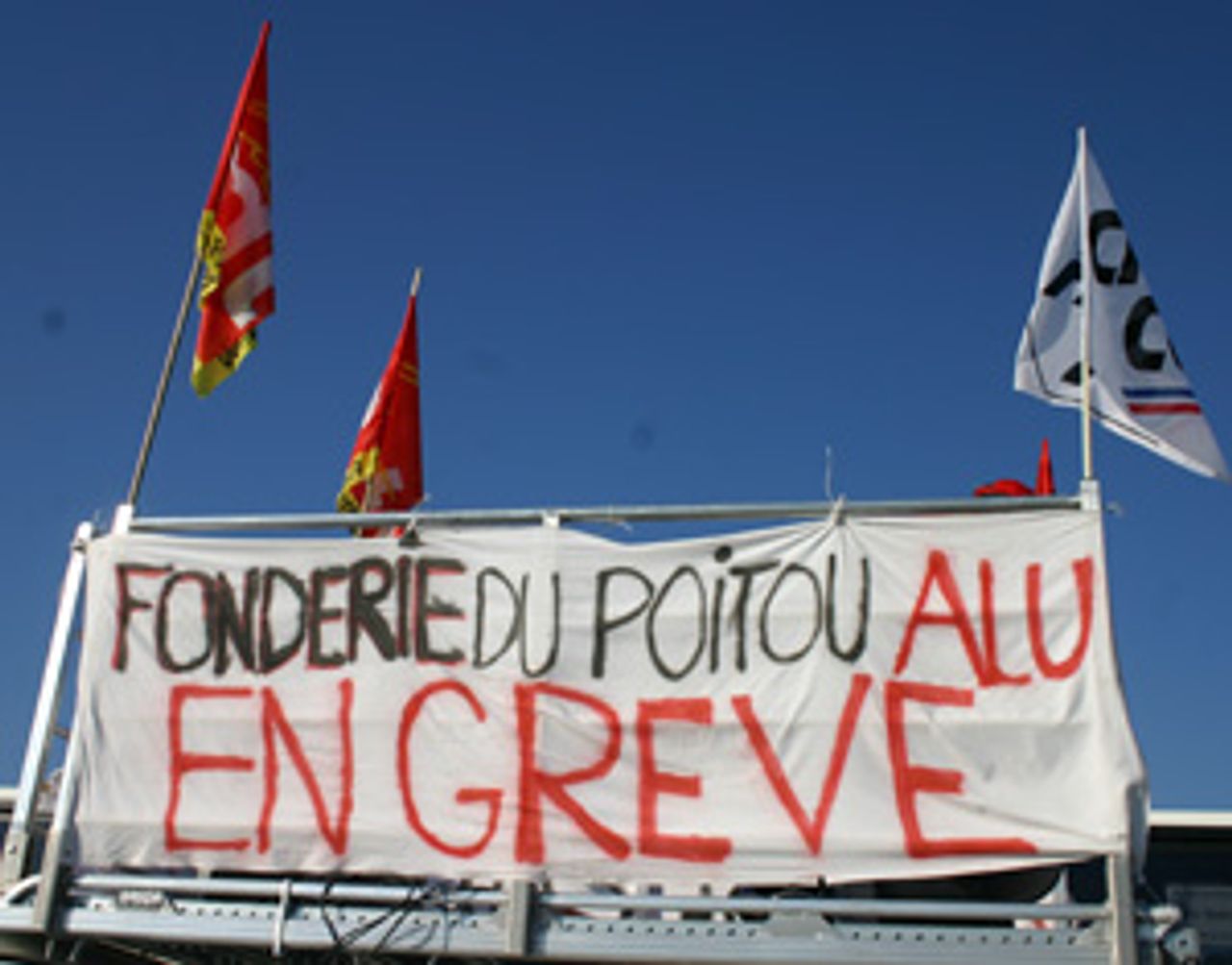 Banner reads: Fonderies du Poitou on strike
Banner reads: Fonderies du Poitou on strikeThe CGT statement continues, with chauvinistic overtones directed against the workers at Montupet plants outside France: “Public money should not be used to finance relocations.”
The CGT appeal concludes with the demand that the Fonderies du Poitou be reintegrated into the Renault motor company, although the union is well aware that Renault itself is in the process of a cost-cutting exercise that will involve “site closures, job cuts, attacks on salaries.”
The government has a 15 percent stake in Renault, which was privatised in 1996. The joint union committee has written a letter to President Nicolas Sarkozy asking him to support this demand and use his influence in Renault to make Montupet give up its competiveness plan. The committee has also made approaches to former Prime Minister Jean-Pierre Raffarin. The unions claim that the shortage of parts is putting Renault under severe pressure.
Immediately after Thursday’s rally in Diors, the committee’s representatives went to a tripartite meeting under the aegis of the préfet (government representative) with the CEO of Montupet, Stéphane Magnon. Europe I reported Garrot’s comment: “It’s failed, Magnon will not withdraw his plan. We talked for four hours and got nowhere and finally he said ‘I won’t withdraw the plan.’” The workers will continue the strike and block the Ingrandes site on Monday.
A strange event illustrating the close collaboration of the unions with the state and the employer occurred at about midday on Thursday. The CGT gathered the protesters in front of the rather flimsy factory gates, led a singing of the “Internationale” and then pushed open the gates and proceeded to march the demonstrators around the large deserted factory, first insisting that the “outils de travail,” means of production, not be touched. Not a policeman was there and the owners obviously had full confidence that the CGT would be able to control its troops, as did the top cop, the préfet.
A WSWS reporting team distributed the article French car workers strike against 23 percent wage cut. They discussed the international implications of their struggle and the tiny mobilisation from the so-called national appeal by the CGT in support of the rally, barely more that the Fonderies du Poitou contingent. No one could name any other sites that had struck in solidarity.
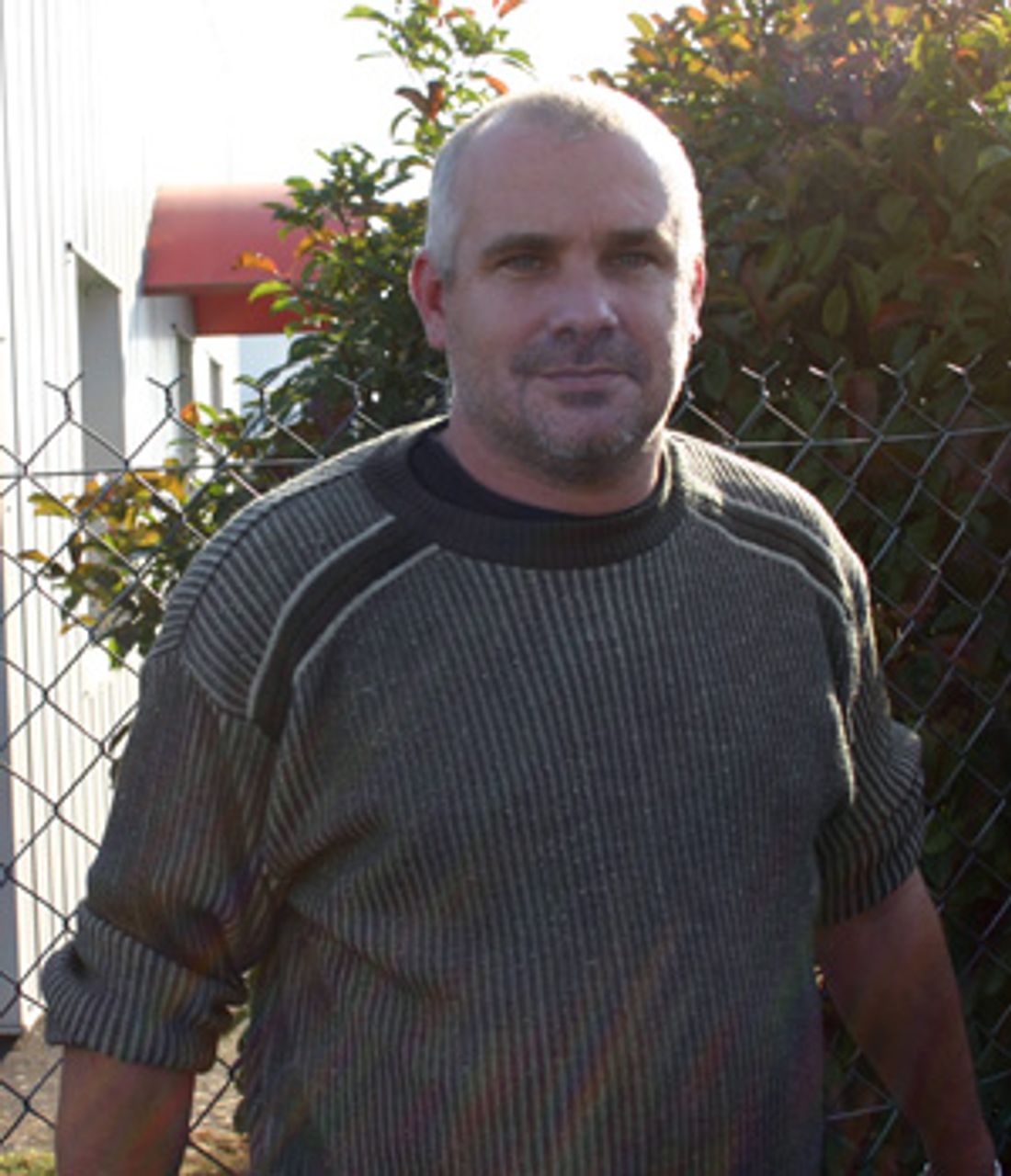 Mikaël
MikaëlThe CGT bureaucrats’ fear of any criticism of their nationalist perspectives and the tenuous hold they have over the workers is revealed by the fact that half an hour after the singing of the “Internationale,” they attacked the only forces fighting for an internationalist and socialist perspective at the protest.
At about 12.30 pm, a group of CGT officials prominently wearing their union badges and somewhat the worse for drink broke into a discussion and aggressively warned the WSWS supporters to leave or be set upon by CGT militants. Pointing at the WSWS leaflet, one said: “You say that Bernard Thibault [the CGT national secretary] works with Sarkozy. You’re just here to cause trouble.” He tried unsuccessfully to snatch the WSWS leaflets.
Mikaël has worked at the Fonderies du Poitou for 13 years. He told the WSWS: “Conditions here have been getting tougher and tougher. This action today is not enough. The unions are responsible for that. We should all be fighting together; I hope that’ll happen one day. The future? It scares me.”
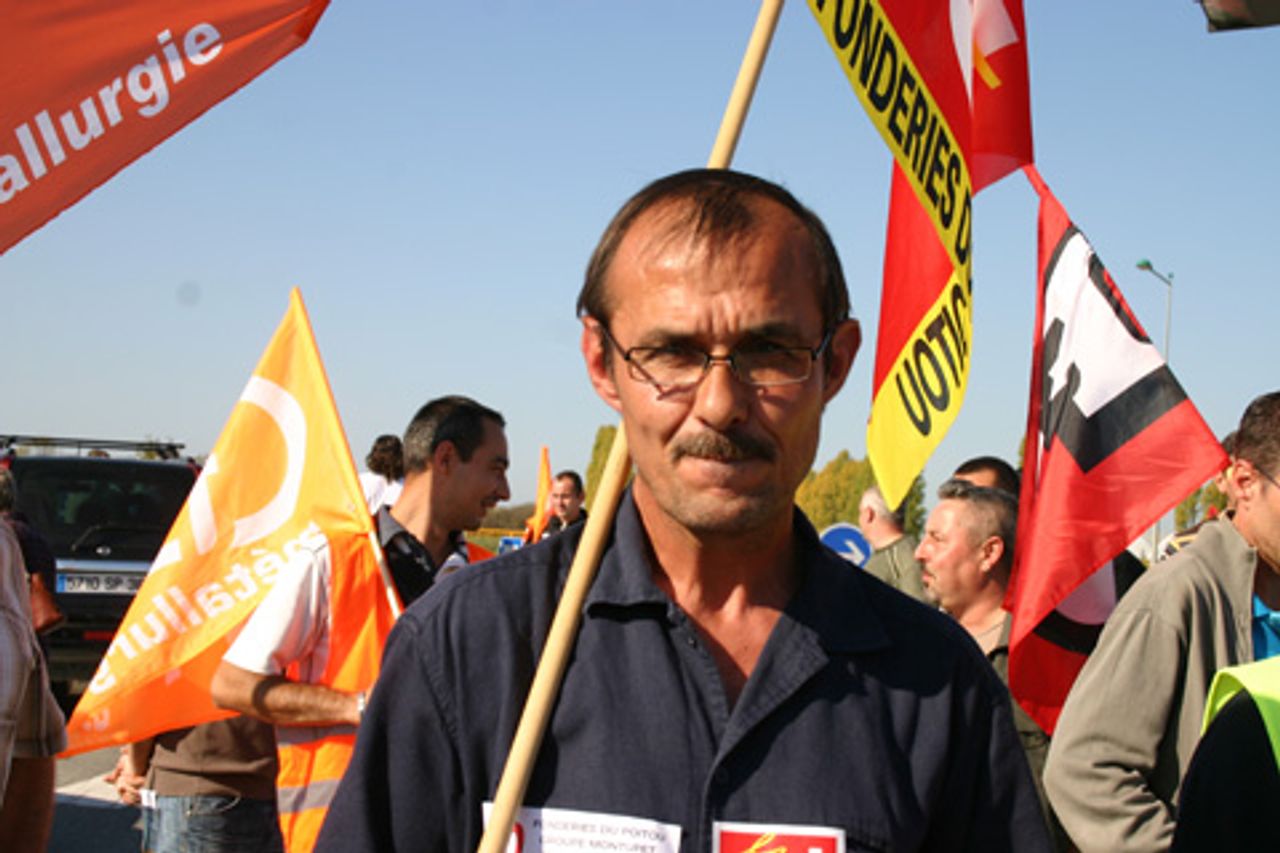 Bernard
BernardBernard, aged 51, with 25 years at the Fonderies du Poitou, says he is a CGT activist without being a member. He spoke of the hard conditions. Many had to be treated for damaged hands from repetitive work. “Two men are now doing the work of four. The human resources manager is always calling us in to put pressure on us to work harder. We took the defeat of the 2010 pensions struggle very badly.
“I don’t think Renault would take us over without the wage cut. I don’t really think it’s a solution. If our wages are cut, life will be impossible. The workers won’t be able to pay back their mortgages, they won’t be able to get loans.”
Anthony, an electrician with three years at the Fonderies du Poitou, spoke of many cases of lung disease and, over the last five or ten years, several cases of cancer caused by the conditions in the plant. “If they cut our wages I prefer to be sacked.”
Subscribe to the IWA-RFC Newsletter
Get email updates on workers’ struggles and a global perspective from the International Workers Alliance of Rank-and-File Committees.
